The key to successful perennial flower bed design lies in understanding bloom times, mature plant sizes, growing conditions, and complementary plant relationships. Whether you dream of cottage garden charm, modern minimalist appeal, or naturalistic meadow beauty, perennial beds can fulfill diverse aesthetic visions while adapting to various site conditions. From sun-drenched Mediterranean themes to cool woodland retreats, these permanent plantings create structured landscapes that evolve beautifully through seasons and years. Smart design considers height variations, seasonal interest, color harmony, and maintenance requirements to establish gardens that flourish with minimal intervention while delivering maximum impact for both homeowners and visiting wildlife.
1. English Cottage Garden Border
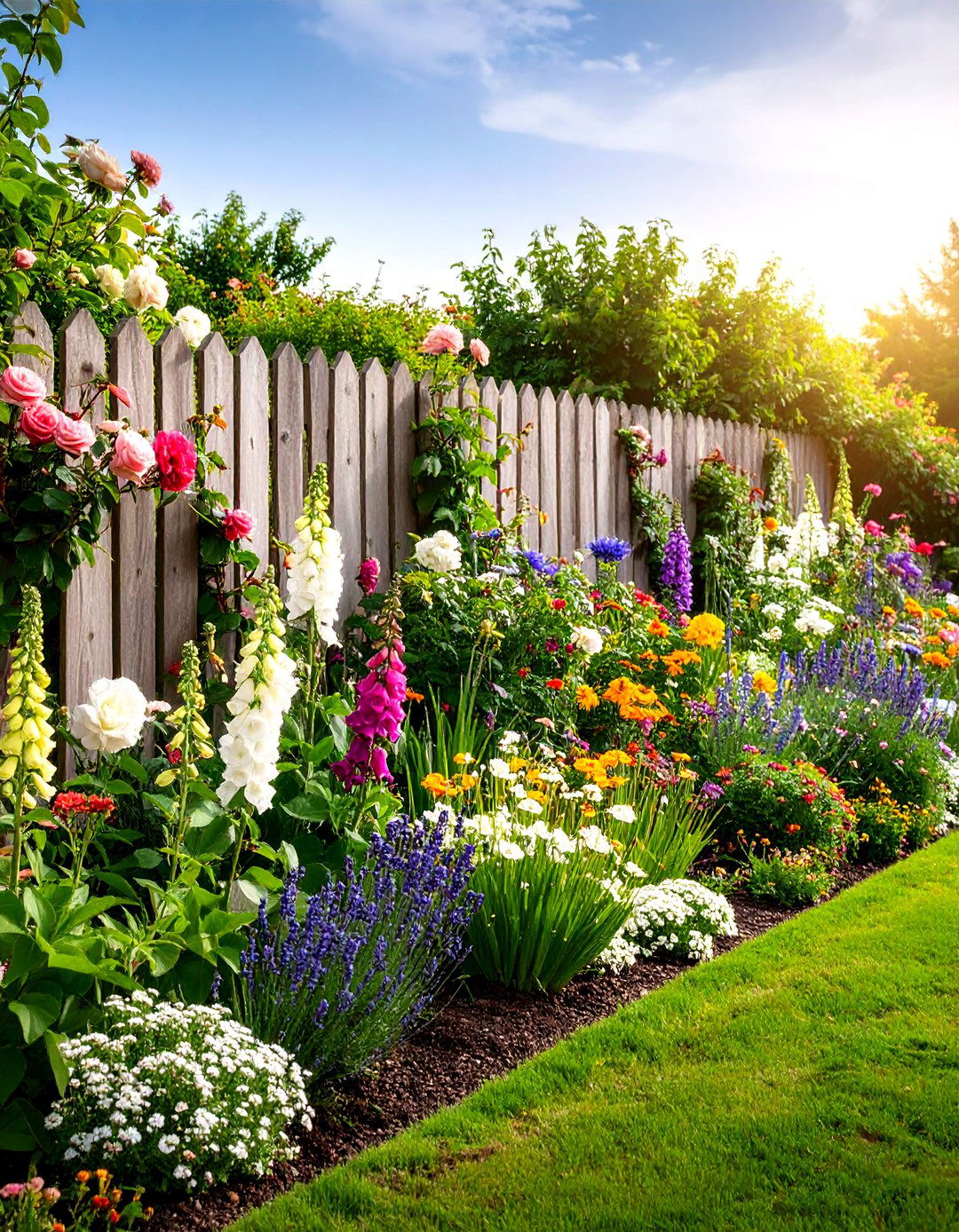
What could be more enchanting than stepping into a storybook garden where roses cascade over weathered fences and delphiniums tower majestically? This timeless design combines traditional perennials like hollyhocks, foxgloves, lavender, and peonies in seemingly casual arrangements that actually require thoughtful planning. The cottage style embraces mixed heights, soft color palettes, and plants that self-seed naturally throughout the space. Sweet peas climb rustic supports while catmint spills onto gravel paths, creating the romantic, lived-in appearance that makes cottage gardens irresistible. Layer spring bulbs beneath summer perennials for extended seasonal interest, and include aromatic herbs like rosemary and thyme.
2. Mediterranean Drought-Tolerant Bed

Can you imagine a garden that thrives in blazing sun while conserving precious water resources? Mediterranean-style perennial beds feature silver-leaved plants, aromatic herbs, and drought-resistant flowers that create stunning displays without intensive irrigation. Lavender forms fragrant hedges alongside ornamental grasses, while globe thistle and sea holly add architectural interest with their spiky textures. Salvias provide continuous color throughout summer months, attracting pollinators while tolerating extended dry periods. The key involves selecting plants native to Mediterranean climates and creating well-draining soil conditions. Stone mulch and gravel pathways complement the naturalistic plantings while reducing maintenance requirements and enhancing the authentic regional aesthetic.
3. Woodland Shade Garden

Why should shady areas remain barren when they can become enchanting woodland retreats? Shade-loving perennials create magical garden rooms beneath tree canopies, featuring hostas with their architectural foliage, delicate ferns, and colorful astilbe plumes. Heucheras contribute year-round interest with burgundy, chartreuse, and silver leaves, while bleeding hearts provide spring romance with their pendulous pink blooms. This design mimics natural forest environments by layering plants at different heights and incorporating fallen logs or stone features. Wild ginger and sweet woodruff serve as living carpets, while hellebores offer winter blooms. The cooling microclimate created makes these gardens perfect relaxation spots during hot summer days.
4. Modern Minimalist Perennial Design

Have you considered how clean lines and restrained plant palettes can create sophisticated contemporary gardens? Modern perennial beds emphasize form, texture, and repetition over busy color combinations. Ornamental grasses like feather reed grass provide vertical structure, while mass plantings of single species create bold statements. Architectural perennials such as agapanthus and daylilies contribute sculptural elements, enhanced by geometric hardscaping and neutral mulches. The color palette remains deliberately limited, perhaps featuring only white flowers with varied foliage tones, or monochromatic blues and purples. This approach requires careful attention to plant forms and seasonal changes to maintain visual interest throughout the year.
5. Native Prairie Meadow Border

Could your garden become a haven for local wildlife while celebrating regional plant heritage? Native prairie-style perennial beds recreate the natural beauty of grassland ecosystems using indigenous plants perfectly adapted to local conditions. Black-eyed Susans, purple coneflowers, and native grasses form the backbone, while wildflowers like blazing star and wild bergamot add seasonal color. These naturalistic plantings support butterflies, birds, and beneficial insects while requiring minimal maintenance once established. The informal design allows plants to seed naturally and create evolving patterns. Seasonal burning or cutting maintains plant health and prevents woody invasion. This sustainable approach reduces irrigation needs and chemical inputs while connecting gardens to their natural surroundings.
6. Three-Season Color Succession Bed
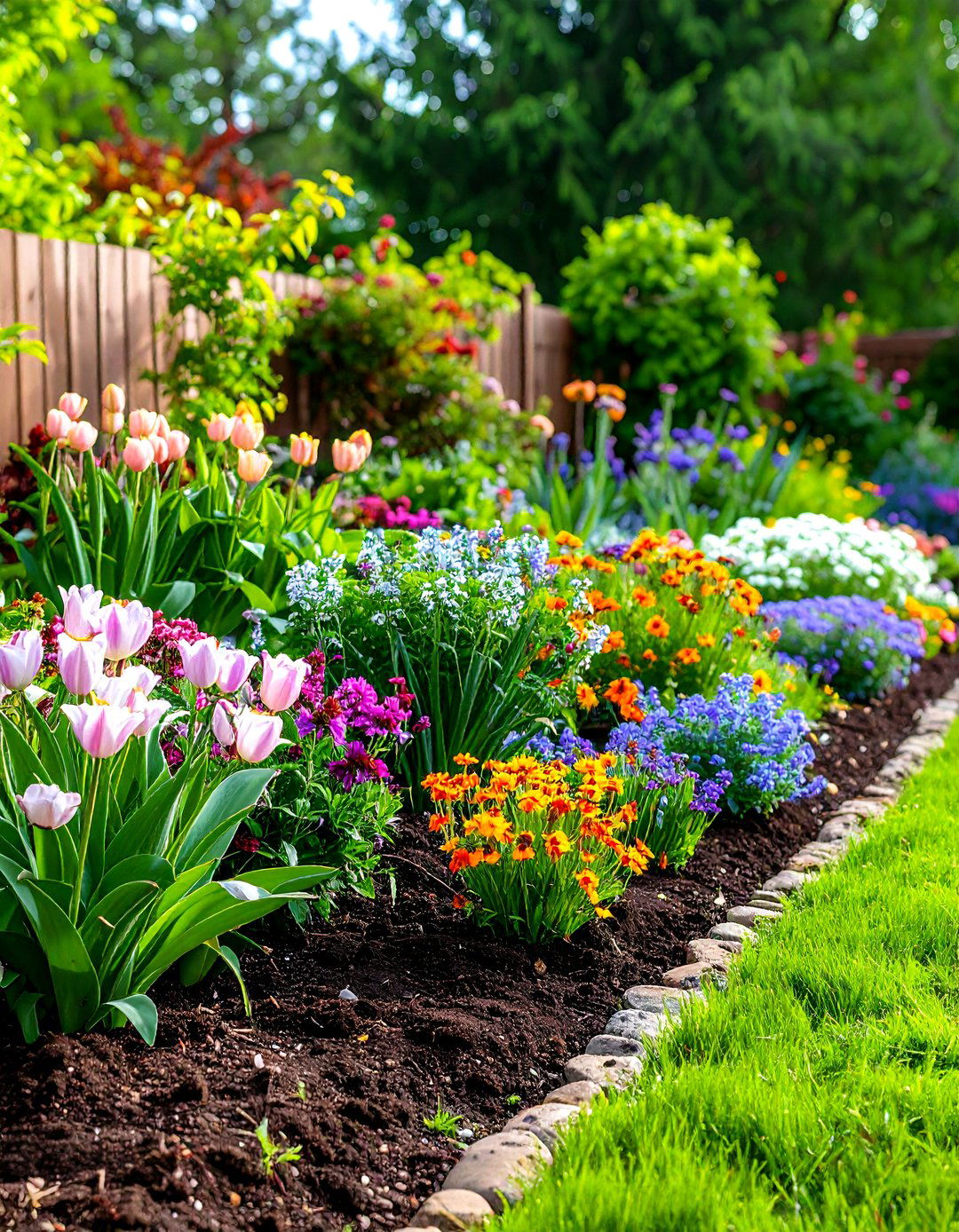
What if your garden maintained continuous bloom from early spring through late fall? Strategic succession planting ensures something spectacular happens in your perennial bed throughout the growing season. Spring begins with early bulbs and hellebores, followed by iris and peonies in late spring. Summer features the main show with daylilies, rudbeckia, and echinacea, while fall concludes with asters, sedum, and ornamental grasses. This design requires careful attention to bloom times and plant placement to avoid bare spots during transitions. Evergreen perennials and winter-interesting seed heads provide structure during dormant seasons. The key involves layering plants with complementary bloom periods while maintaining cohesive design themes.
7. Hot Color Border Design
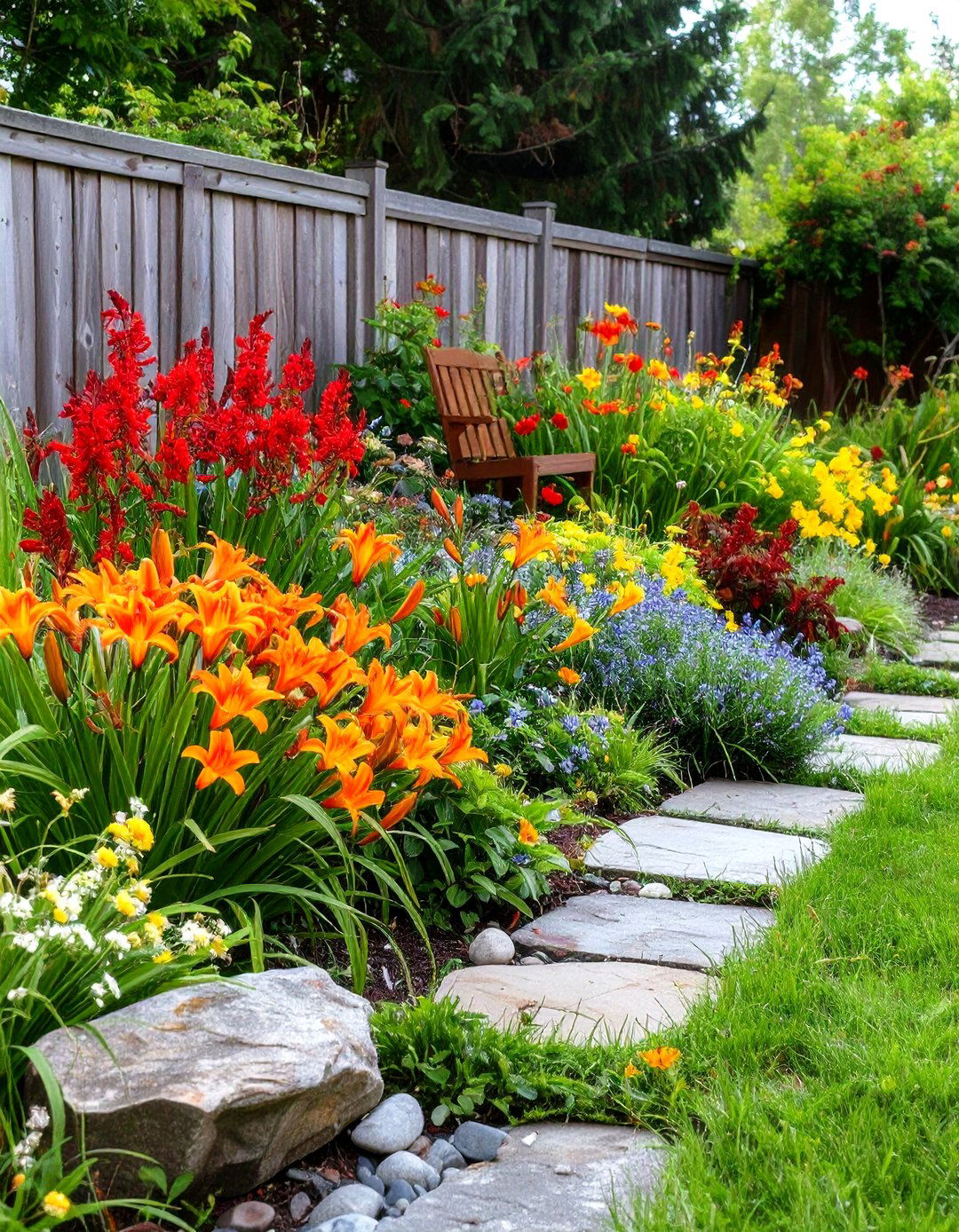
Are you ready to embrace bold, energizing colors that stop traffic and spark conversations? Hot color perennial borders feature fiery reds, brilliant oranges, and sunny yellows that create dramatic focal points in landscape designs. Crocosmia, red-hot poker, and orange day lilies provide the primary color punch, while supporting plants in burgundy and bronze foliage enhance the overall intensity. This high-impact design works particularly well against neutral backgrounds like evergreen hedges or stone walls. The warm color palette appears to advance visually, making gardens seem closer and more intimate. Careful plant selection ensures blooms appear throughout the season, maintaining the energetic atmosphere that makes these borders unforgettable garden features.
8. Cool Color Calming Garden

Do you seek serenity and tranquility in your outdoor sanctuary? Cool color perennial beds create peaceful retreats using blues, purples, whites, and soft pinks that promote relaxation and contemplation. Lavender, catmint, and Russian sage provide aromatic blue-purple flowers, while white roses and campanulas add elegant contrast. This sophisticated palette creates depth and appears to recede visually, making small gardens seem larger and more expansive. Silver-leaved plants like lamb's ear and artemisia enhance the cooling effect while providing textural interest. Evening enjoyment becomes magical as white flowers seem to glow in fading light. The restrained color scheme creates timeless elegance that complements various architectural styles while promoting peaceful garden experiences.
9. Butterfly Pollinator Paradise

Can you imagine your garden buzzing with colorful butterflies and busy bees throughout the growing season? Pollinator-focused perennial beds combine nectar-rich flowers with larval host plants to support complete butterfly lifecycles. Native milkweeds support monarch butterflies, while purple coneflowers and bee balm provide abundant nectar sources. The design includes plants with different flower shapes and bloom times to accommodate various pollinator species and their feeding preferences. Shallow water sources and basking areas enhance habitat value. Avoiding pesticides protects beneficial insects, while allowing some areas to remain less manicured provides overwintering sites. This ecological approach creates beautiful gardens while supporting declining pollinator populations and contributing to local ecosystem health and biodiversity.
10. Rock Garden Alpine Collection
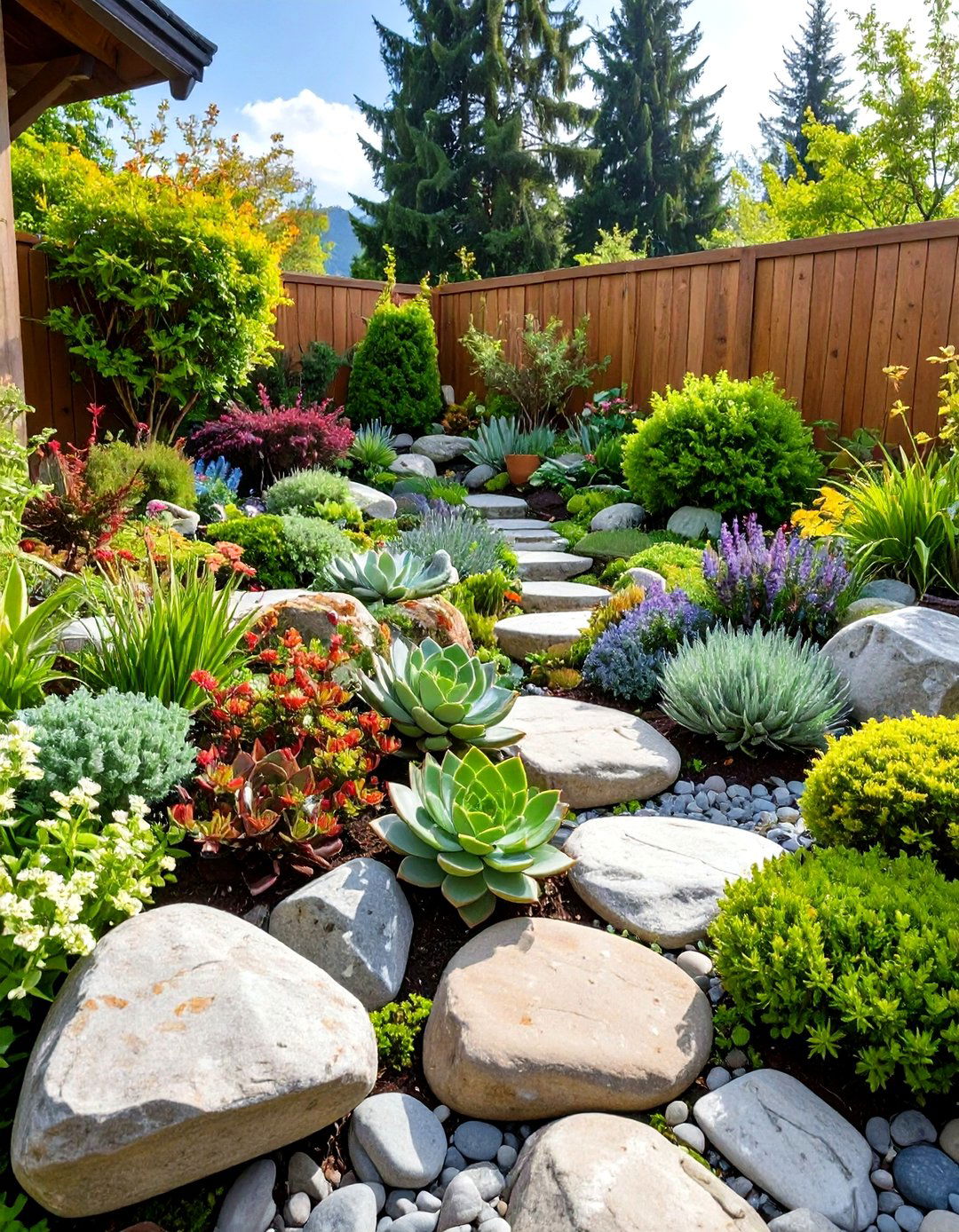
What treasures can thrive in challenging rocky terrain where most plants struggle to survive? Alpine perennial rock gardens recreate mountain environments using specialized plants adapted to excellent drainage and intense sunlight. Sedums, sempervivums, and alpine asters nestle between natural stone arrangements, creating miniature landscapes that change dramatically with seasons. The design emphasizes proper drainage through raised beds, gravel amendments, and strategic stone placement. Small-scale plants prevent overcrowding while maintaining proportional relationships with hardscape elements. Spring brings delicate wildflower blooms, while summer features succulent textures and forms. This low-maintenance approach suits challenging sites and creates unique garden focal points that celebrate the beauty of adaptation and resilience in harsh conditions.
11. Fragrant Evening Garden

Have you ever experienced the magical transformation that occurs when gardens release their perfumes into cooling twilight air? Evening-focused perennial beds feature plants that bloom or become most fragrant during nighttime hours. Night-blooming cereus, four o'clocks, and evening primroses open as daylight fades, while jasmine and honeysuckle release intense fragrances. This sensory design creates intimate spaces perfect for evening relaxation and entertaining. White and pale flowers become luminous in moonlight, creating ethereal garden rooms. The strategic placement near patios, walkways, or bedroom windows maximizes fragrance enjoyment. Night-flying pollinators like moths appreciate these specialized plantings, adding ecological value to the romantic atmosphere. Such gardens extend outdoor living hours and create memorable experiences.
12. Vertical Climbing Perennial Display
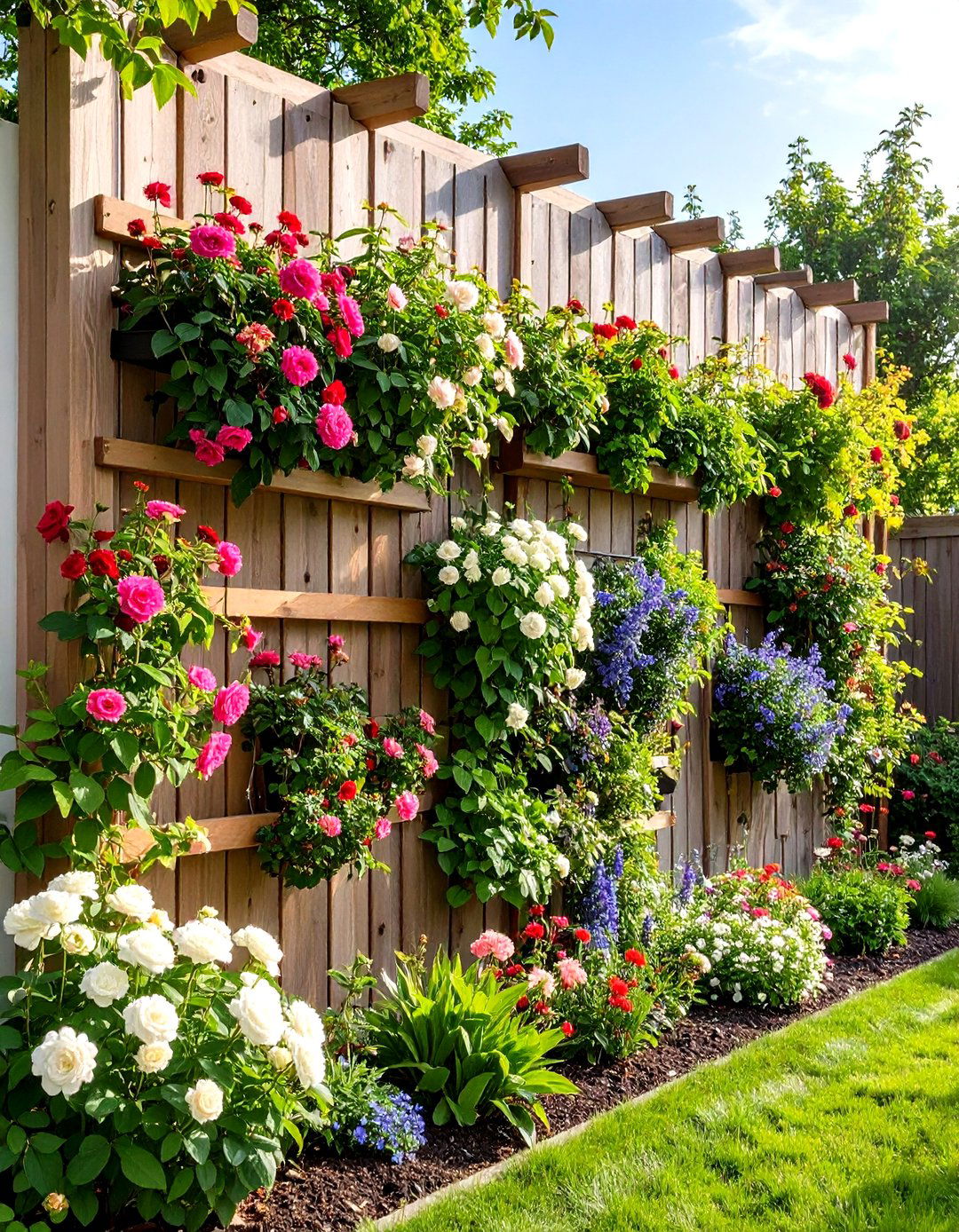
Could neglected walls and fences become spectacular living artworks covered in blooming perennials? Vertical perennial gardens maximize growing space while creating privacy screens and architectural interest. Climbing roses, clematis, and honeysuckle scramble over supports, while wall-trained perennials like espaliered coral vine create formal patterns. The design incorporates both permanent climbing structures and seasonal support systems for herbaceous climbers. Ground-level plantings hide bare lower stems while extending the display downward. This three-dimensional approach transforms flat surfaces into dynamic garden features that change throughout seasons. Proper support installation and regular maintenance ensure healthy plant development and long-term structural integrity. The vertical element adds drama and sophistication while solving space limitations in smaller gardens.
13. Ornamental Grass Meadow
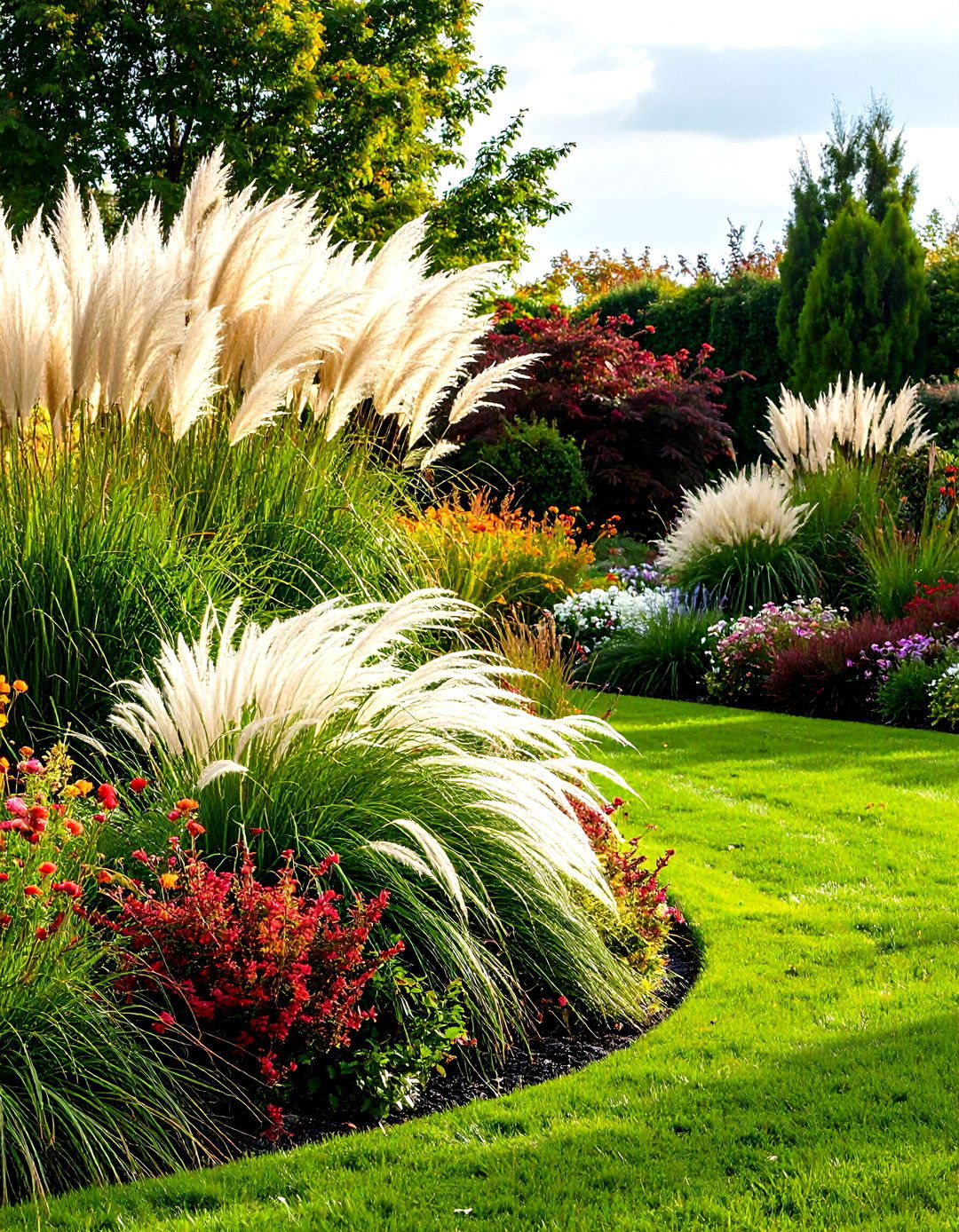
What happens when ornamental grasses take center stage in flowing, naturalistic perennial plantings? Grass-dominated perennial beds create movement, sound, and seasonal interest through dramatic foliage changes and graceful seed heads. Fountain grass, maiden grass, and little bluestem provide the structural backbone, while scattered perennial flowers add seasonal color accents. This low-maintenance design celebrates the beauty of grasses while supporting wildlife and reducing irrigation needs. The informal arrangement allows natural seeding and creates evolving patterns that change yearly. Fall and winter become spectacular seasons as grasses turn golden and seed heads catch snow or frost. The contemporary aesthetic suits modern architecture while providing habitat for birds and small wildlife that appreciate the shelter and seeds.
14. Cutting Garden Perennial Bed

Do you dream of harvesting armloads of fresh flowers for indoor arrangements throughout the growing season? Dedicated cutting garden perennial beds prioritize flower production and stem quality over landscape display. The design features rows or blocks of single varieties for easy harvesting, including long-stemmed flowers like delphiniums, gladioli, and rudbeckia. Supporting plants provide foliage and filler material for arrangements. Regular cutting encourages continued bloom production while maintaining plant health and vigor. The utilitarian layout emphasizes function over ornamental design, though careful variety selection creates attractive working gardens. Succession planting ensures continuous harvests, while proper spacing allows air circulation and reduces disease problems. This practical approach brings garden beauty indoors while maintaining productive outdoor spaces.
15. Children's Discovery Garden
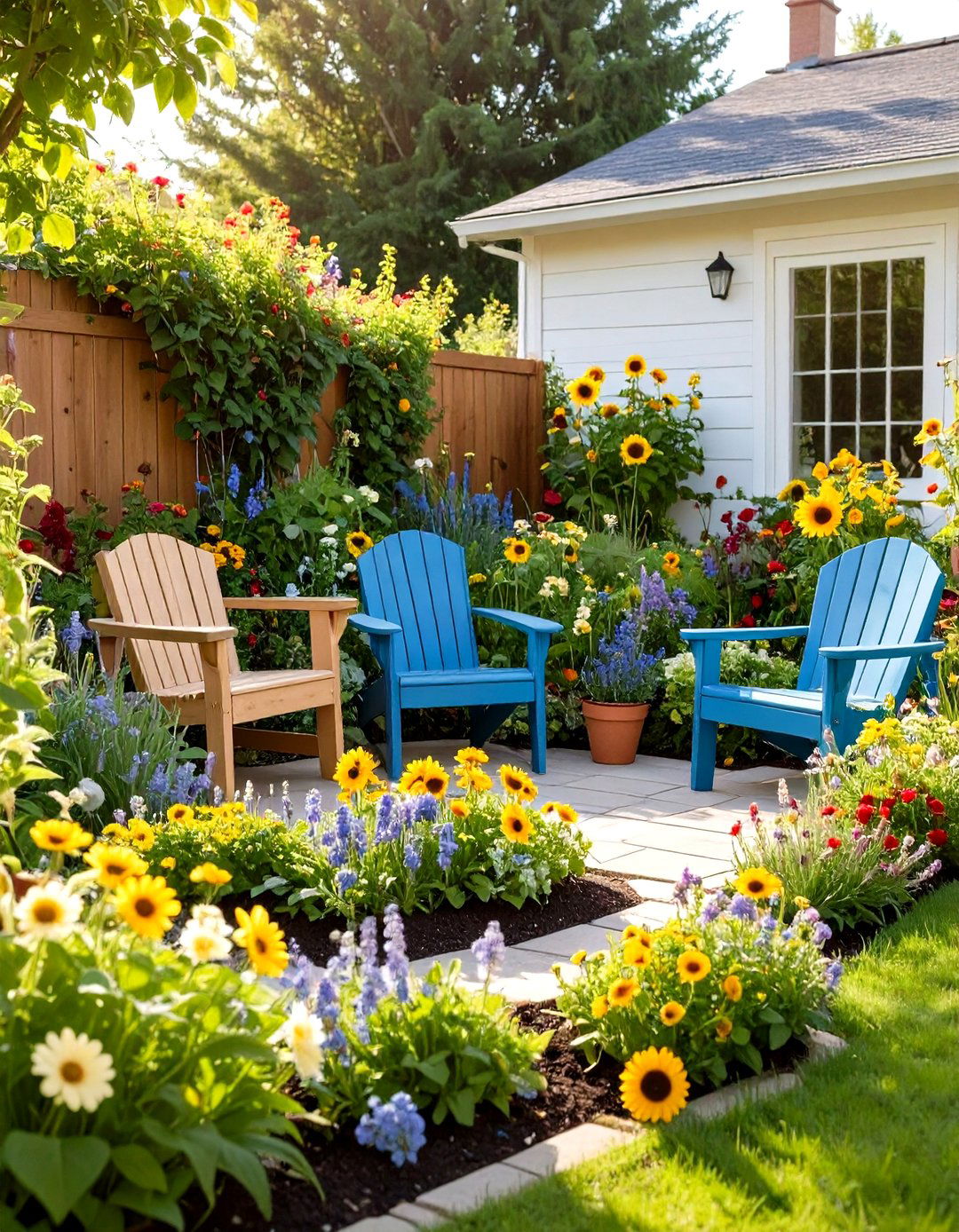
Can perennial gardens become magical learning laboratories where children explore nature's wonders and develop lifelong environmental connections? Child-friendly perennial beds feature plants with interesting textures, unusual forms, and interactive qualities that engage young minds. Lamb's ear provides fuzzy tactile experiences, while snapdragons make sounds when squeezed. Giant sunflowers create living playhouses, and ornamental grasses rustle mysteriously in breezes. The design includes safe paths, discovery zones, and plants that attract butterflies and beneficial insects for observation opportunities. Educational signage and hands-on activities enhance learning experiences. Low-maintenance perennials ensure gardens remain attractive even with enthusiastic young gardeners helping. This approach fosters environmental stewardship while creating beloved family gathering spaces that inspire future generations of gardeners and nature lovers.
16. Seasonal Succession Border
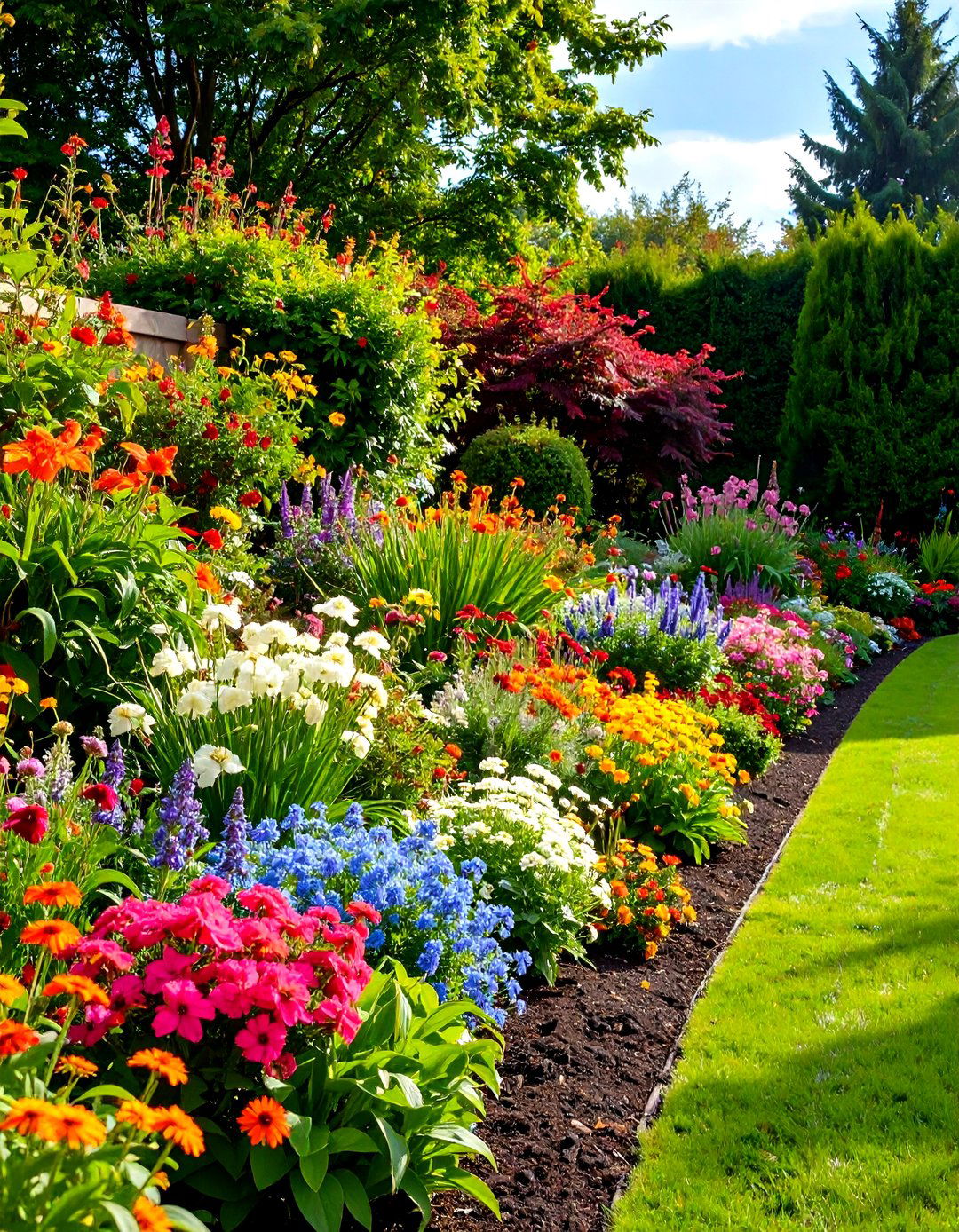
What strategies ensure your perennial border delivers spectacular displays that seamlessly transition from season to season without gaps? Succession-planted perennial borders layer early, mid, and late-season bloomers to maintain continuous interest throughout the growing period. Careful planning coordinates bloom times so that as one group fades, another reaches peak performance. Spring bulbs and early perennials give way to summer stars, followed by fall-blooming asters and late-season grasses. The design considers foliage quality during non-bloom periods and incorporates evergreen elements for winter structure. Deadheading and strategic pruning extend bloom periods while maintaining garden appearance. This sophisticated approach requires detailed plant knowledge but rewards gardeners with borders that never disappoint visitors or family members seeking beauty throughout the seasons.
17. Rain Garden Bioswale

Could your perennial garden solve drainage problems while creating stunning wildlife habitat and reducing environmental impact? Rain garden perennial beds manage stormwater runoff using plants adapted to alternating wet and dry conditions. Native sedges, cardinal flower, and blue flag iris thrive in these specialized environments while filtering pollutants and preventing erosion. The design incorporates gentle slopes and strategic plant placement to slow water flow and encourage infiltration. Attractive stone features and meandering paths make functional gardens beautiful landscape elements. Seasonal flooding creates dynamic growing conditions that support unique plant communities. This sustainable approach addresses modern environmental challenges while creating distinctive garden features that demonstrate ecological responsibility and celebrate the beauty of native plant adaptations to challenging conditions.
18. Therapeutic Sensory Garden

Have you considered how perennial gardens can provide healing experiences and therapeutic benefits for people facing physical or emotional challenges? Sensory-focused perennial beds engage all five senses through carefully selected plants and thoughtful design elements. Textured foliage, fragrant flowers, and plants with interesting sounds create multi-sensory experiences. Raised beds ensure accessibility for wheelchair users or those with mobility limitations. The design includes quiet seating areas, gentle water features, and plants known for calming properties like lavender and chamomile. Color psychology influences plant selection, while maintenance requirements remain minimal to reduce stress. This compassionate approach creates inclusive spaces that welcome all visitors while providing documented therapeutic benefits including stress reduction, improved mood, and enhanced overall wellbeing.
19. Victorian Heritage Garden

What secrets can historical garden styles reveal about creating timeless beauty with carefully chosen perennial plants? Victorian-inspired perennial beds recreate the formal elegance and plant collecting enthusiasm of the 19th century. Geometric designs feature heritage varieties of iris, peonies, and roses arranged in symmetrical patterns. Ornate edging, topiary elements, and formal pathways enhance the period authenticity. The plant palette emphasizes varieties available during Victorian times, often including fragrant flowers and unusual specimens that reflect the era's fascination with botanical exploration. Careful maintenance maintains the formal appearance, while period-appropriate accessories like ornate benches and decorative urns complete the historical atmosphere. This nostalgic approach celebrates gardening heritage while creating sophisticated landscapes that honor traditional design principles and plant breeding achievements.
20. Moonlight White Garden

Does the idea of a garden that glows ethereally in evening light and moonbeams capture your imagination? White-themed perennial beds create magical nighttime experiences using flowers and foliage in pure whites, creams, and silver tones. White roses, nicotiana, and moonflowers provide luminous blooms, while silver-leaved plants like dusty miller and artemisia enhance the ethereal effect. The monochromatic design appears sophisticated and calming during daylight hours, then transforms dramatically as evening falls. Strategic lighting enhances the moonlight effect while ensuring safe navigation. Fragrant white flowers like jasmine and night-blooming cereus add sensory depth to the visual spectacle. This romantic approach creates intimate garden rooms perfect for evening entertaining and quiet contemplation under starlit skies.
21. Hummingbird Haven Perennial Bed

Could your garden become a bustling refueling station for these remarkable tiny acrobats of the bird world? Hummingbird-attracting perennial beds feature tubular flowers in bright reds, oranges, and fuchsias that provide essential nectar sources. Bee balm, cardinal flower, and salvias offer abundant feeding opportunities, while native plants support the insects that comprise important protein sources in hummingbird diets. The design incorporates perching spots, nesting materials, and water sources to create complete habitat. Bloom succession ensures nectar availability throughout migration periods and breeding seasons. Avoiding pesticides protects both hummingbirds and their food sources. This wildlife-focused approach creates dynamic gardens filled with movement and activity while supporting declining hummingbird populations and contributing to conservation efforts that protect these extraordinary aerial artists and their habitats.
22. Coastal Wind-Resistant Border

What perennial plants can withstand salt spray, constant winds, and challenging coastal conditions while creating stunning seaside gardens? Coastal perennial beds feature plants adapted to maritime environments, including sea thrift, seaside goldenrod, and beach pea. These tough perennials tolerate salt exposure, sandy soils, and strong winds that would devastate inland garden plants. The design emphasizes low-growing, clumping forms that resist wind damage while creating natural windbreaks for more tender plants. Native coastal plants provide the best adaptation and support local ecosystems. Mulching with local materials like seaweed or shell fragments enhances the maritime theme while providing plant protection. This specialized approach creates beautiful gardens that celebrate coastal environments while withstanding the unique challenges that make seaside gardening both difficult and rewarding.
23. Four-Season Interest Border
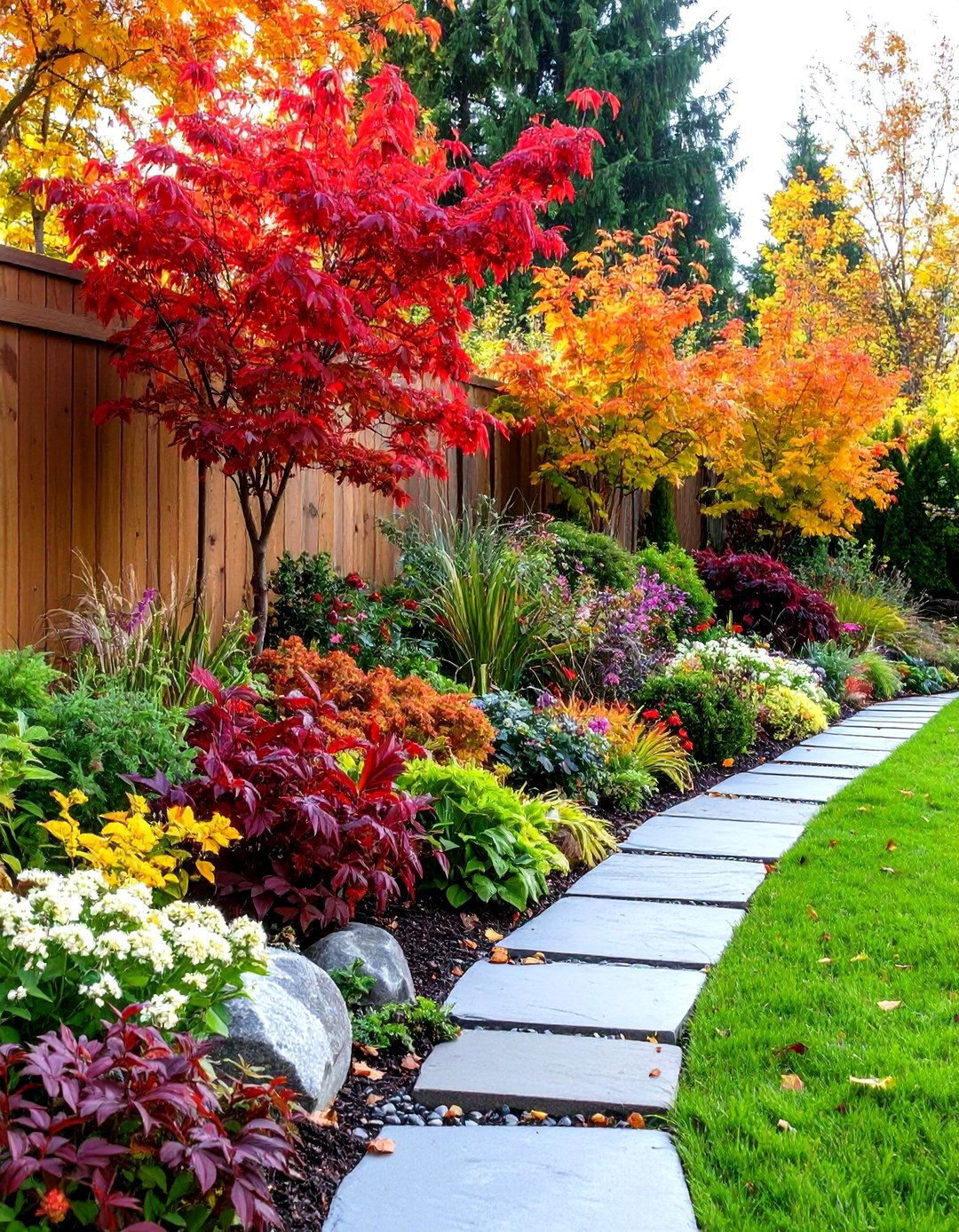
Can a single perennial border provide captivating beauty through spring awakening, summer abundance, autumn transformation, and winter structure? Four-season perennial beds carefully orchestrate year-round interest through strategic plant selection and design principles. Spring features emerging foliage and early bloomers, summer showcases peak flowering displays, autumn provides dramatic foliage changes and seed heads, while winter reveals architectural plant forms and evergreen structure. The design incorporates plants valued for multiple seasonal attributes rather than brief bloom periods. Ornamental grasses provide winter interest, while hellebores bloom during dormant seasons. Careful pruning schedules maintain plant health while preserving winter features. This comprehensive approach rewards gardeners with landscapes that remain engaging and beautiful regardless of season, weather conditions, or natural cycles that typically leave gardens dormant.
24. Perennial Permaculture Food Forest
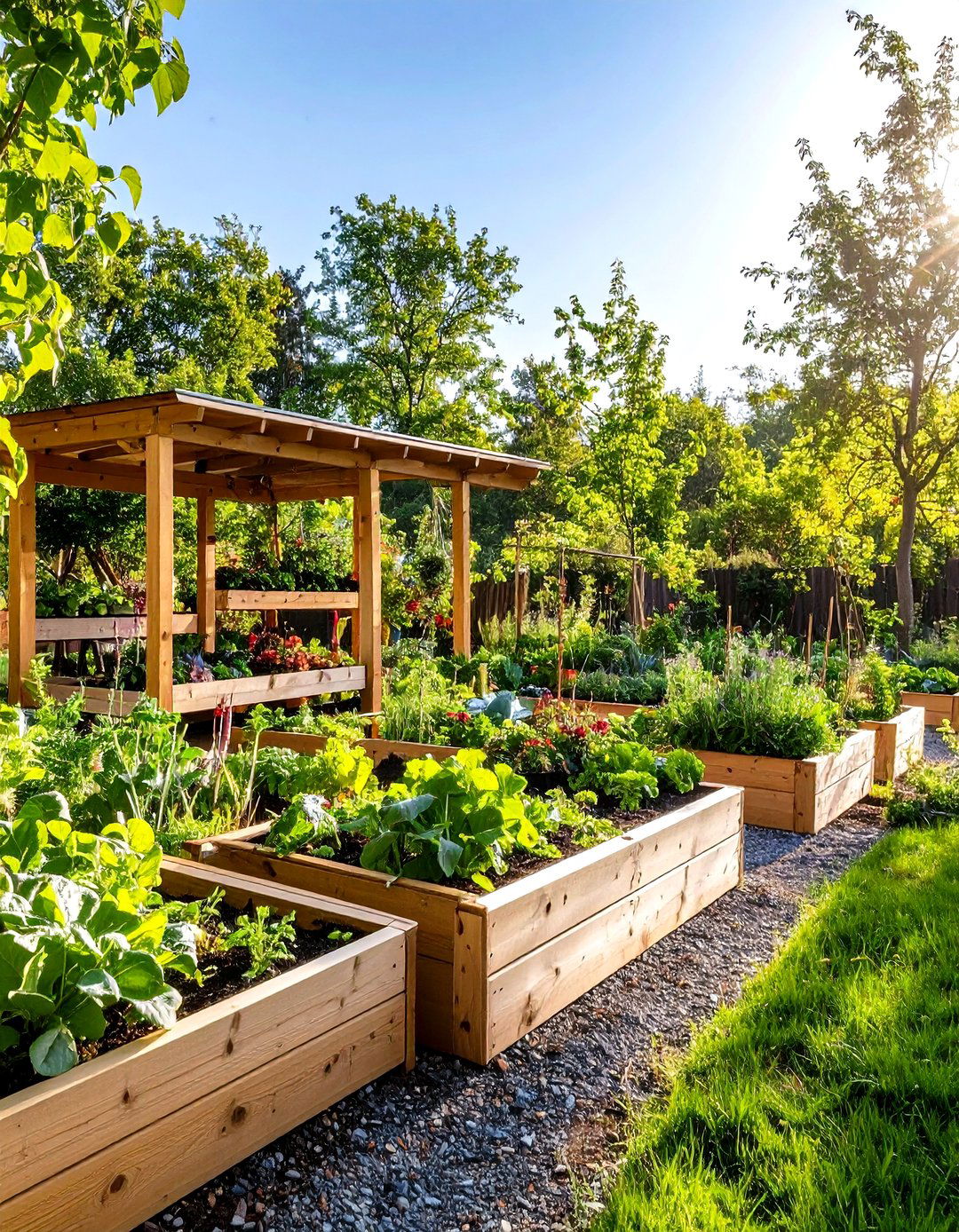
What possibilities emerge when edible perennials integrate with ornamental plants to create productive, beautiful, and sustainable garden ecosystems? Permaculture-inspired perennial beds combine food production with aesthetic appeal using plants that serve multiple functions. Fruit trees provide canopy structure, while berry bushes offer mid-level productivity and seasonal interest. Perennial vegetables like asparagus and rhubarb contribute to the edible landscape, while herbs provide culinary value and pollinator support. The design mimics natural forest ecosystems through layered plantings that create beneficial relationships between species. Nitrogen-fixing plants improve soil fertility, while ground covers suppress weeds and retain moisture. This holistic approach demonstrates how gardens can provide food security, environmental benefits, and visual beauty while reducing external inputs and supporting biodiversity through thoughtful integration of productive and ornamental elements.
Conclusion:
Creating successful perennial flower beds requires thoughtful planning, patience, and understanding of plant relationships, but the rewards far exceed the initial investment of time and energy. These permanent gardens mature into spectacular displays that improve annually while providing habitat for beneficial wildlife, reducing maintenance requirements, and offering sustainable beauty that adapts to changing environmental conditions. Whether your vision embraces cottage garden romance, modern minimalist elegance, or ecological prairie meadows, perennial beds provide the framework for realizing diverse aesthetic dreams while supporting environmental stewardship goals.
The key to perennial garden success lies in matching plants to site conditions, understanding mature plant sizes, and designing for seasonal interest that extends beyond brief bloom periods. Smart gardeners consider foliage textures, autumn color, winter structure, and wildlife value when selecting plants that will create cohesive, thriving communities. Regular maintenance, strategic plant division, and occasional design updates keep perennial beds fresh and vigorous while allowing natural evolution that makes established gardens increasingly beautiful with age.


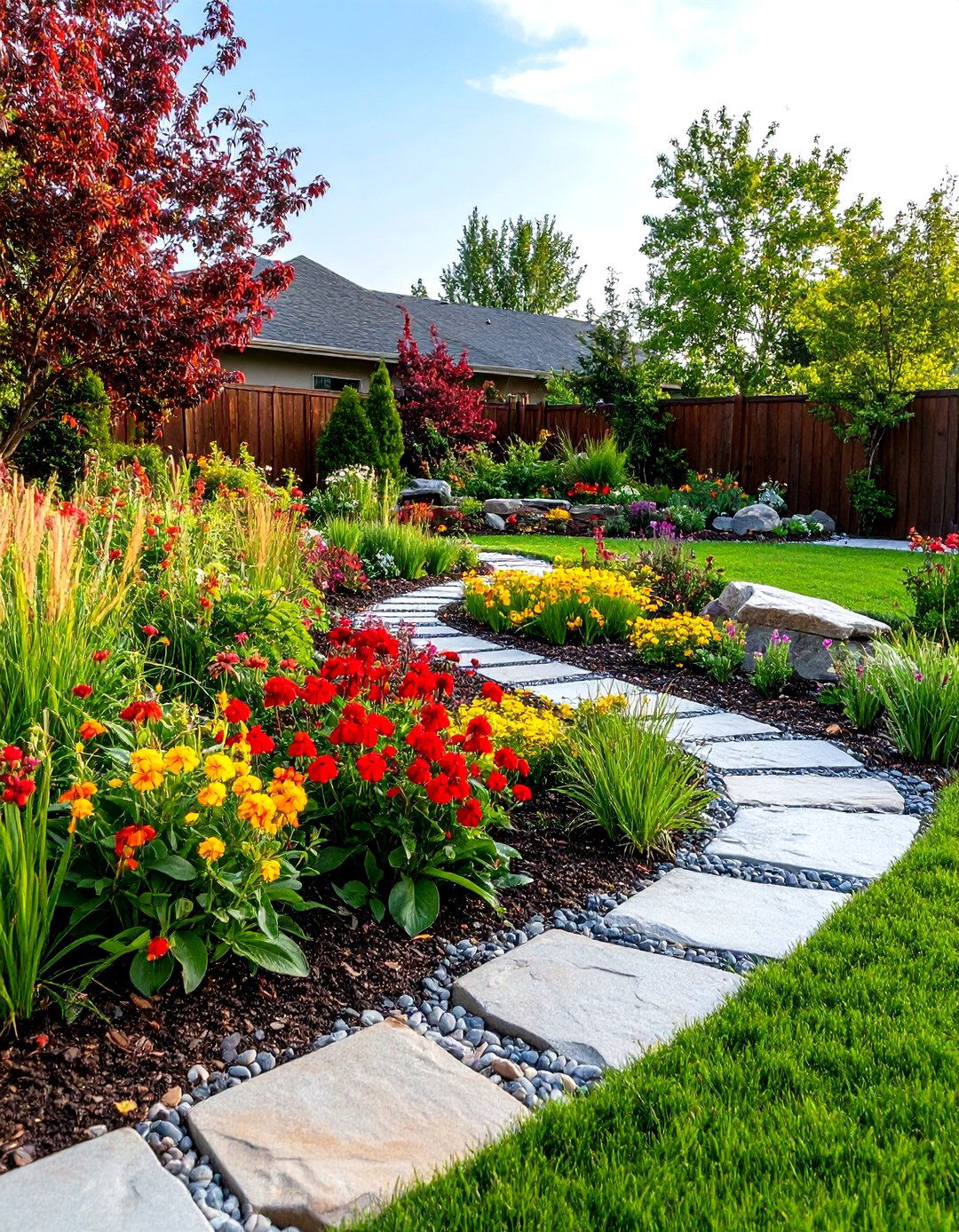


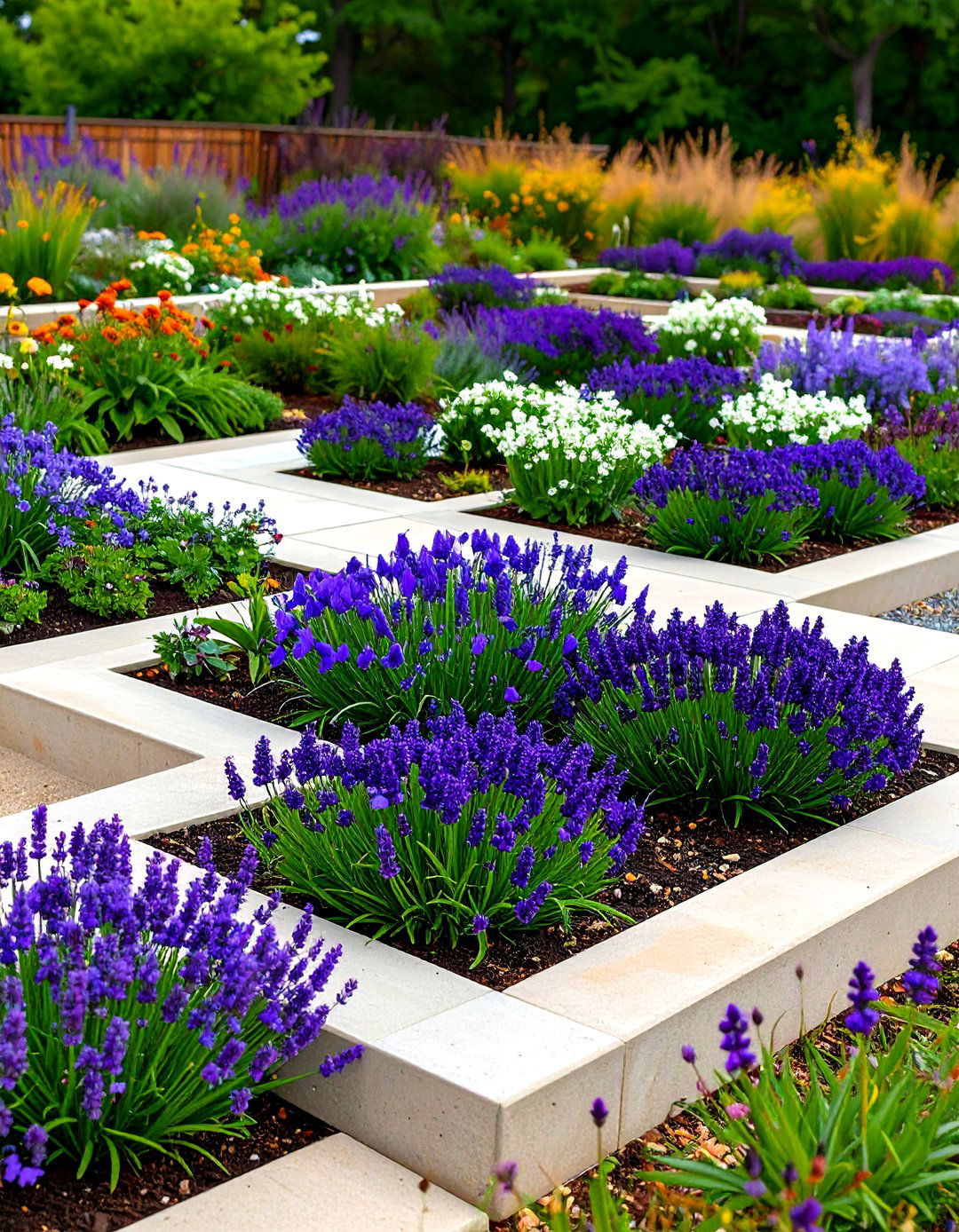
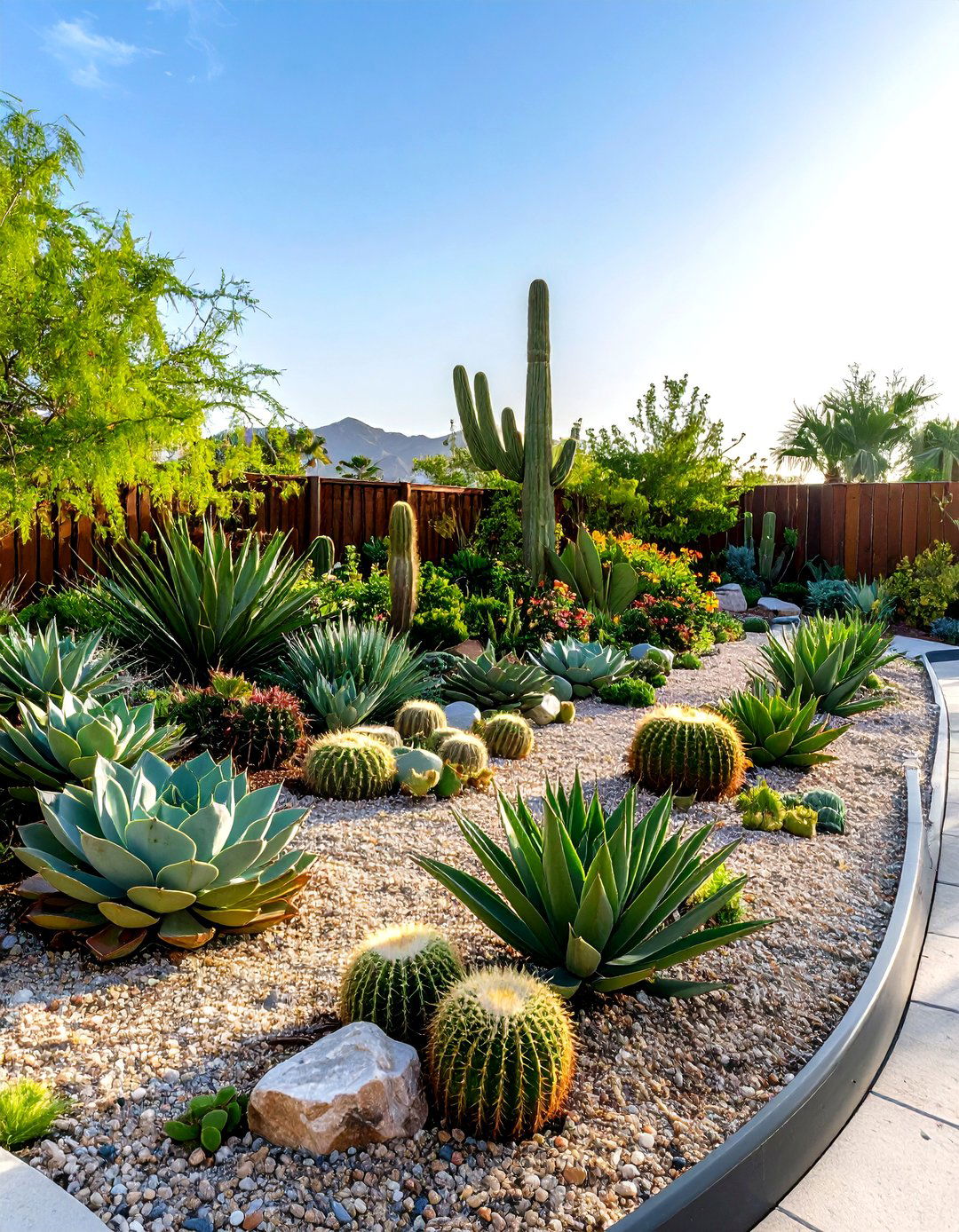
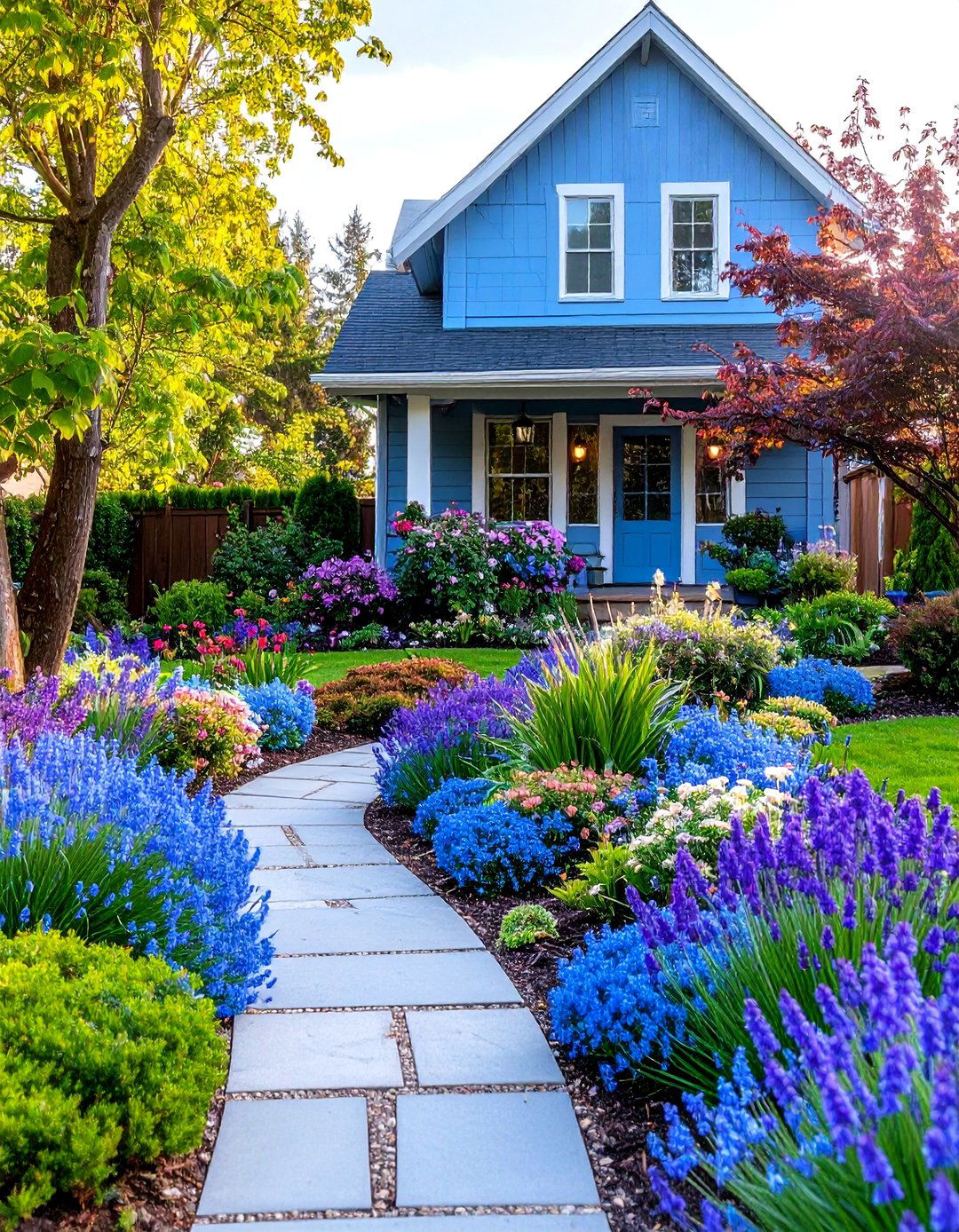
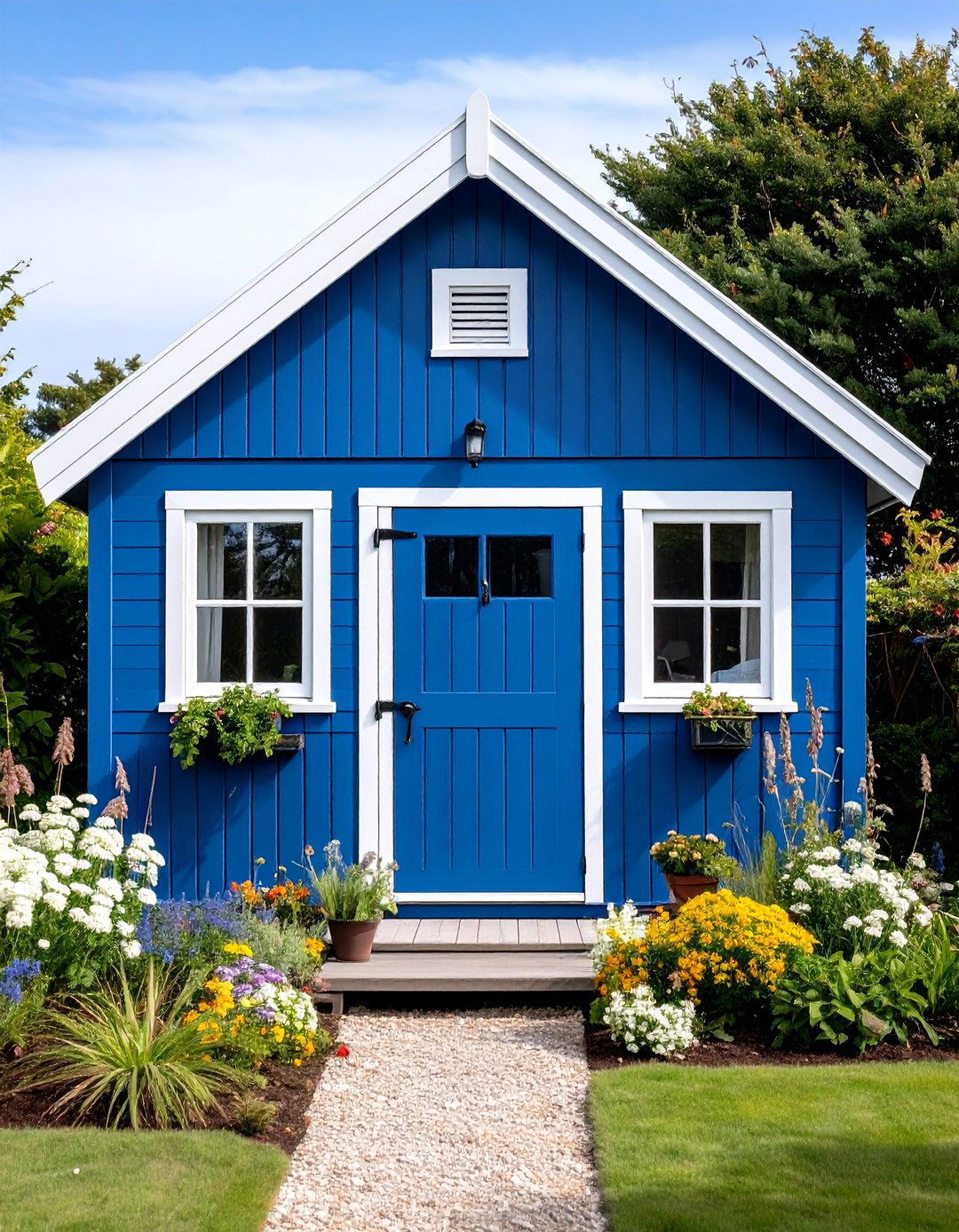


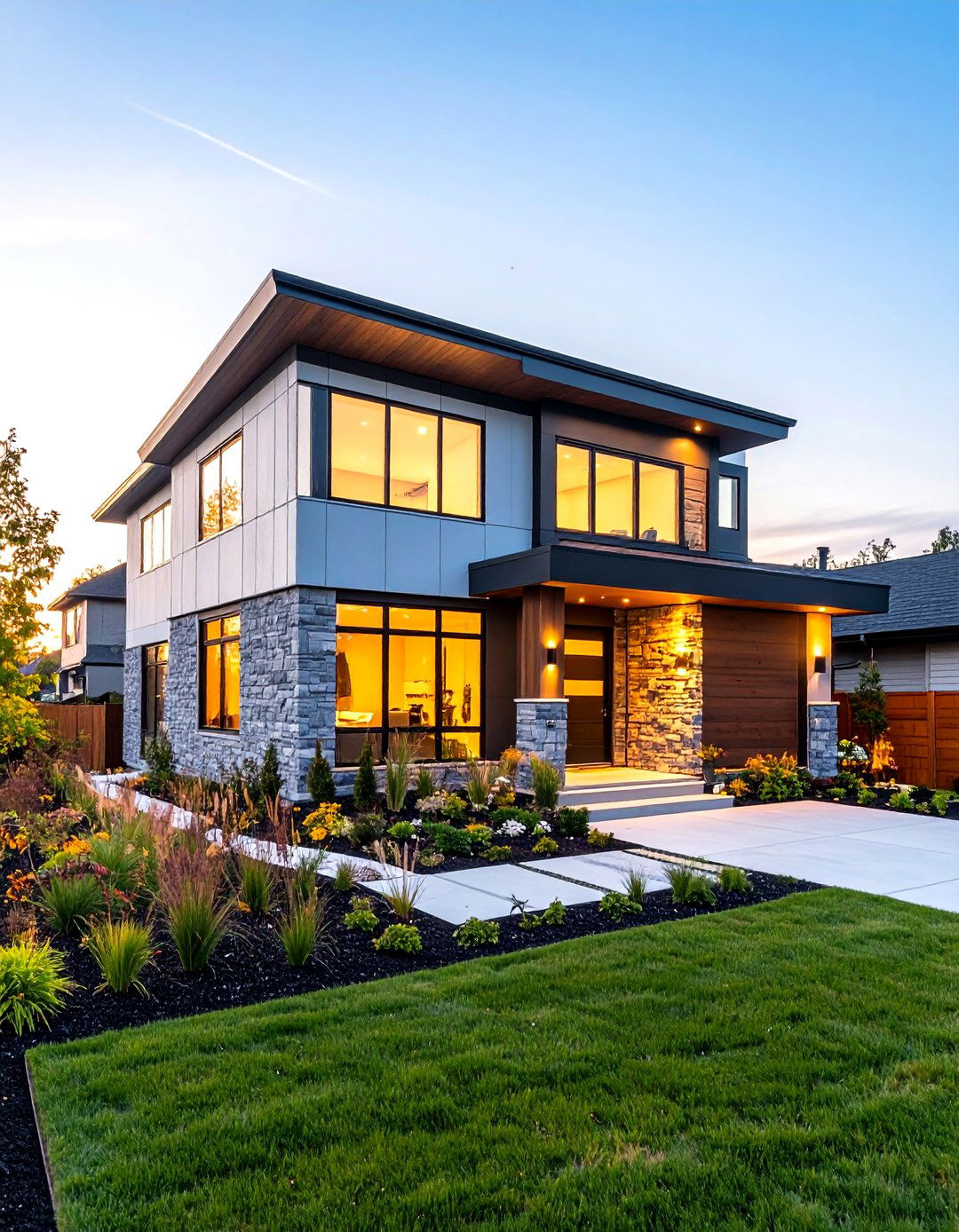
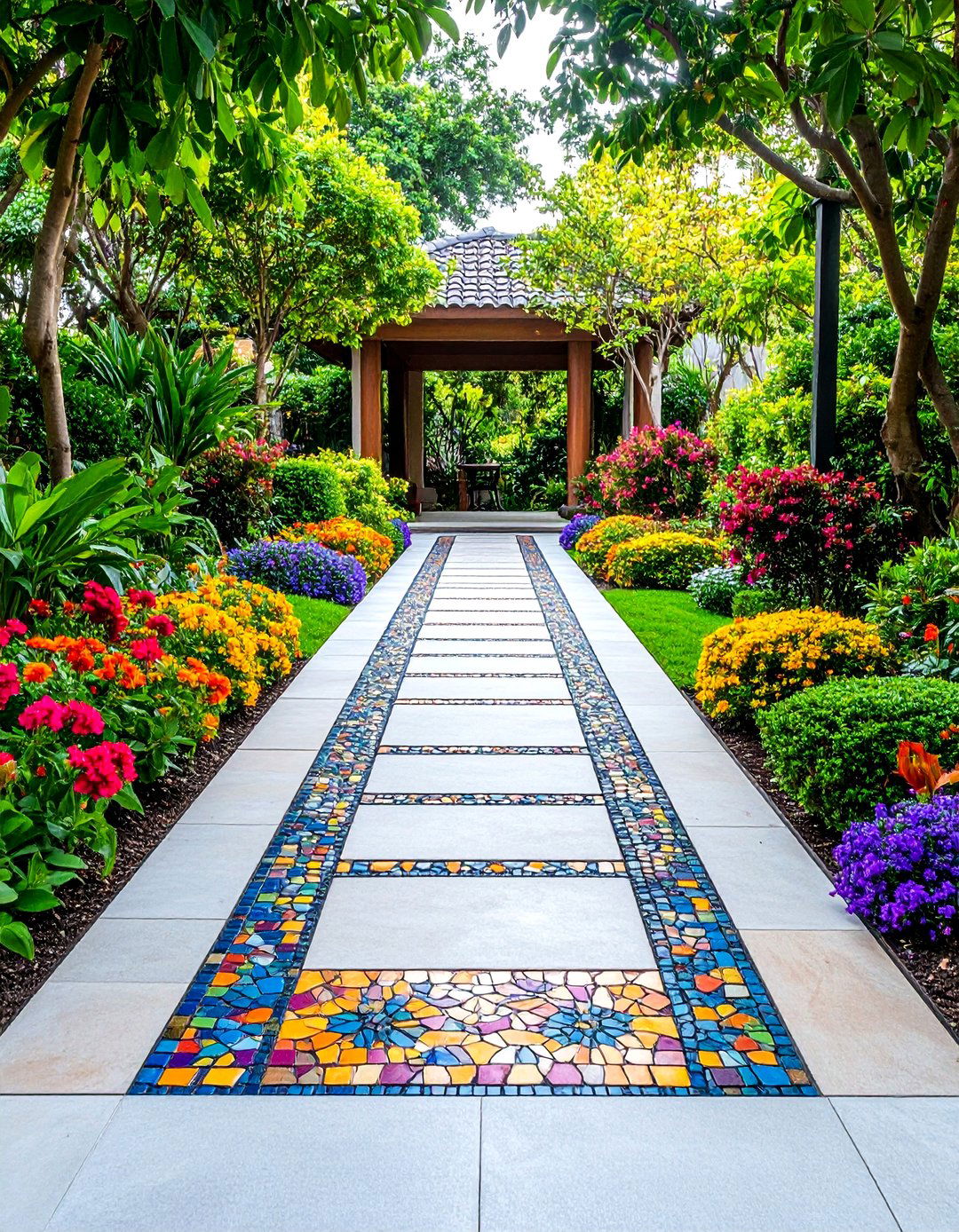


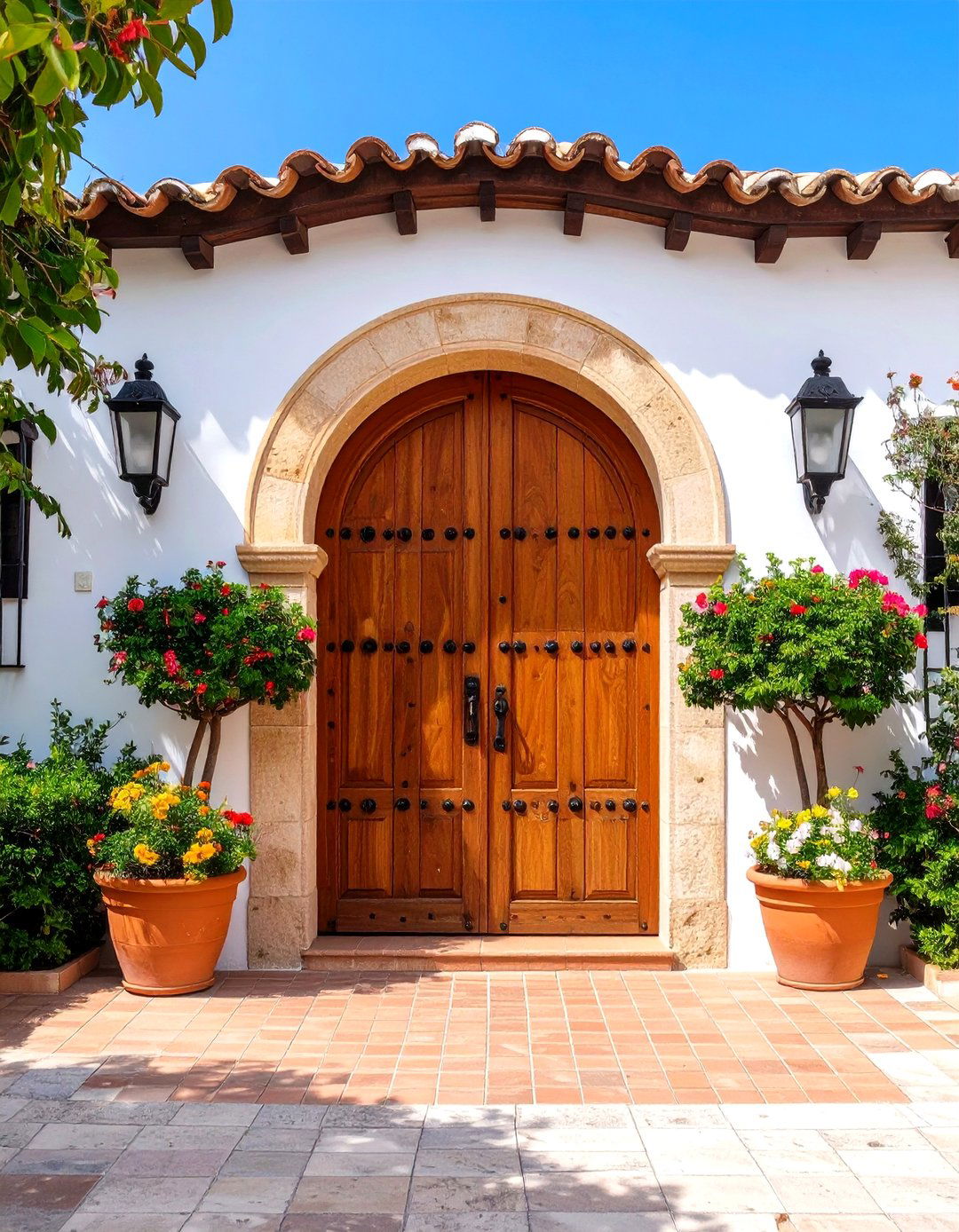


Leave a Reply